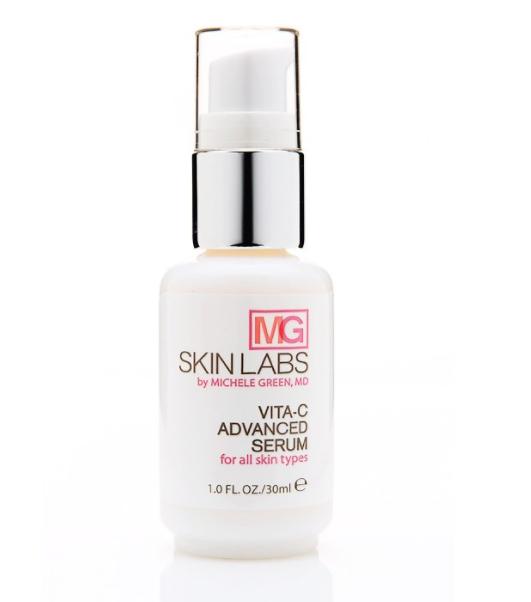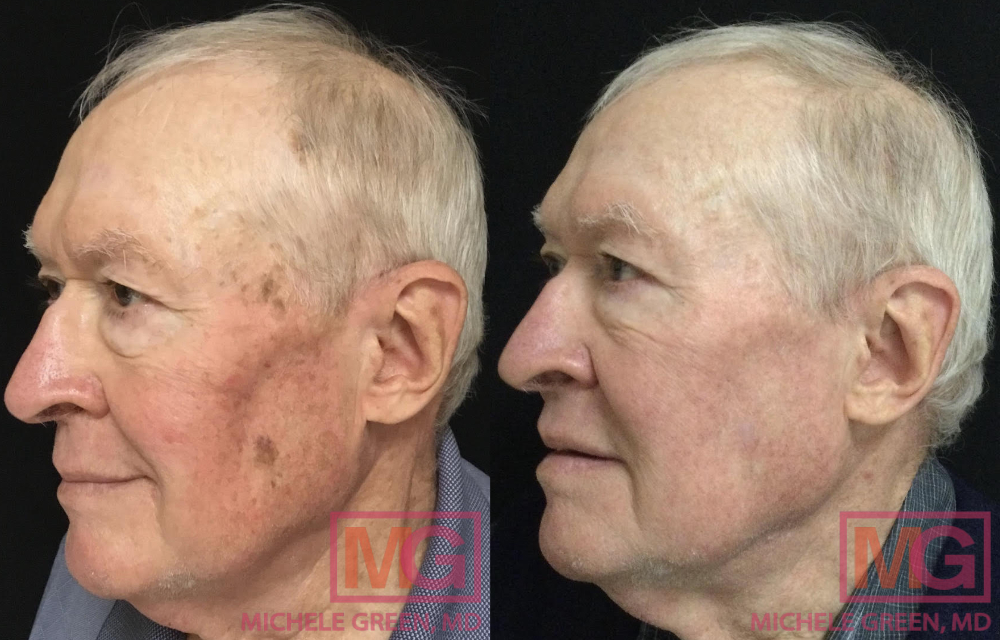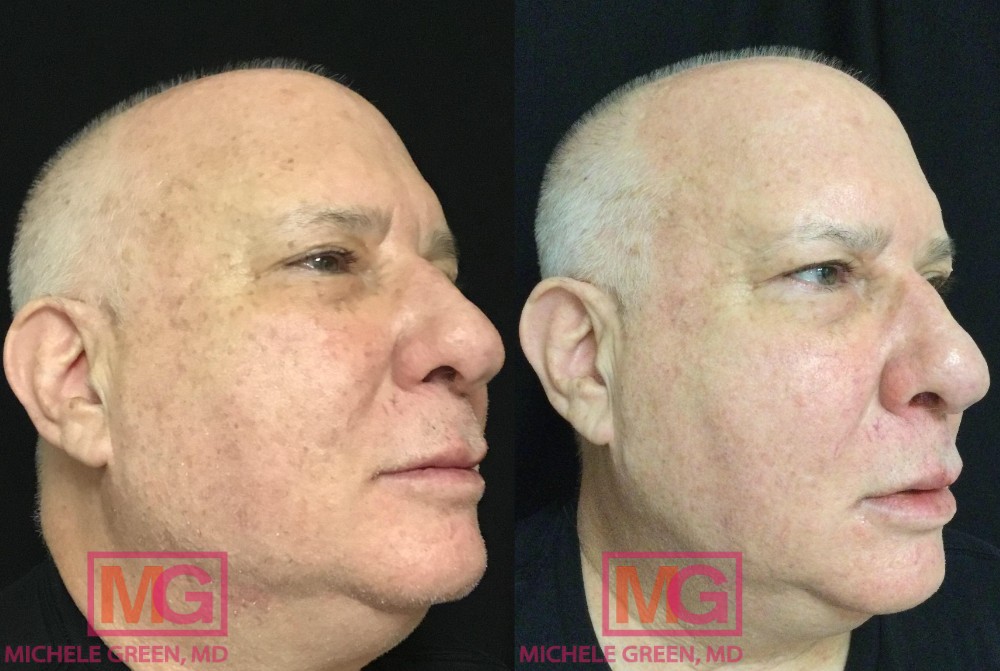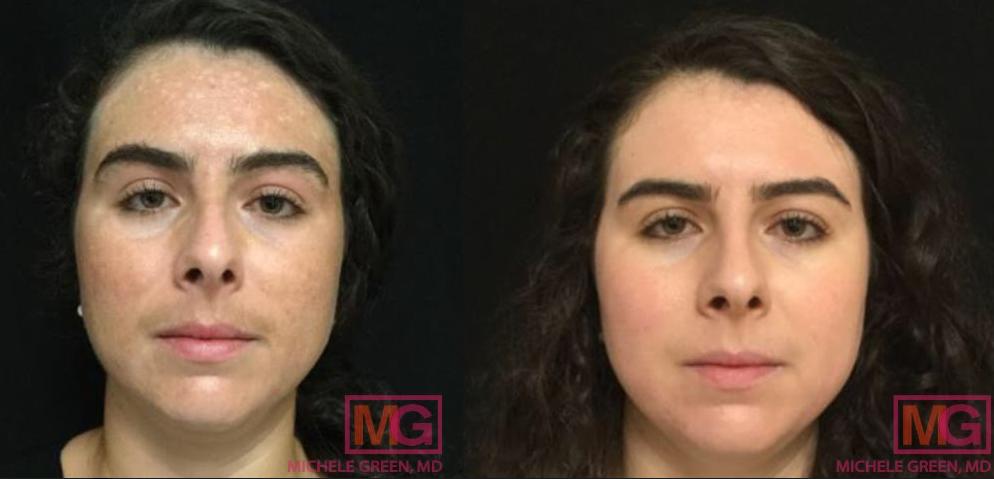How to Remove Dark Spots on the Face
As we age, dark spots can form on the face due to the production of excess melanin, which may result from scarring, inflammation, untreated acne blemishes, skin conditions such as melasma, or unprotected sun exposure. One of the most common types of dark spots are sun spots—also known as age spots, solar lesions, or liver spots—which is hyperpigmentation is characterized by flat, brown spots that typically form on areas of the body most often exposed to the sun, such as the face, hands, arms, and shoulders, and is most common in patients over 40 years of age. Unlike precancerous lesions, dark spots are harmless. However, they can be distressing signs of aging that can make patients feel self-conscious, particularly when hyperpigmentation occurs on highly visible parts of the body, such as the face, arms, chest, and hands. Luckily, there are many treatment options available at Dr. Michele Green’s New York City dermatology office to lighten the skin, create a more even skin tone, and eliminate signs of sun damage.
Many skincare products for skin lightening are available over the counter, making it challenging to determine which ones are effective and which are not. For that reason, the best first step in finding the best dark spot remover for you is to schedule a consultation with expert dermatologist Dr. Michele Green. Dr. Green will begin by examining the treatment area to determine the type of hyperpigmentation you are experiencing, as dark spots caused by melasma or inflammation should be treated differently than those caused by unprotected sun exposure. After the exam, Dr. Green will recommend the treatment or series of treatments that will be most effective for her patient’s unique needs. Most often, Dr. Green recommends dark spot removal products containing such key ingredients as kojic acid, azelaic acid, lactic acid, glycolic acid, vitamin C, vitamin E, and vitamin A, which all help to brighten the skin and produce a more even skin tone.
Experienced board-certified dermatologist Dr. Michele Green has been expertly treating patients at her Upper East Side, New York City dermatology office for more than 25 years. In addition to treating cases of age spots and hyperpigmentation, Dr. Green is a master at addressing other effects of the natural aging process, such as fine lines, wrinkles, sagging skin, volume loss, and uneven skin tone and skin texture with such treatments as Botox, dermal fillers, laser treatments, microneedling, chemical peels, and more. Along with addressing cosmetic concerns, Dr. Green provides many treatment options for medical conditions associated with dark spots, including skin cancer, melasma, and rosacea. With her proprietary line of skincare products, MGSKINLABs, Dr. Green can recommend the highest quality topical lightening creams, lotions, cleansers, acne treatments, and sunscreens. Well-known for high patient satisfaction, Dr. Green has been consistently voted one of the best dermatologists in New York City by such publications as Castle Connolly, Super Doctors, and New York Magazine.
Why do dark spots, hyperpigmentation, and discoloration form on the face?
Dark spots form on the surface of the skin as a result of repeated overexposure to the sun’s harmful UVA and UVB rays. Without proper sun protection, UV rays can cause damage to the DNA in the skin, and, as such, the body reacts in order to prevent that damage by increasing the production of melanin in the skin. Melanin is a chemical in the body that gives the skin pigmentation, which is produced by cells in the body known as melanocytes. When the skin is exposed to the sun without sunscreen or other sun protection, the enzyme tyrosinase triggers the melanocytes in the exposed area to multiply, increasing the body’s melanin production. The melanin produced helps absorb UV rays to protect the skin; however, the result is a dark spot in the affected area. The number of sun spots and scope of the pigmentation are due to the amount of sun damage sustained over a lifetime – the more frequent and severe the sun exposure, the greater the depth and breadth of skin discoloration. In addition to sun damage, scarring, inflammation, or skin conditions such as melasma can cause certain forms of hyperpigmentation.
Will dark spots on the face go away?
Patients often wonder, “Do dark spots on the face go away?” Once dark spots have formed on the face due to sun damage, scarring, post-inflammatory hyperpigmentation, or melasma, they often do not disappear on their own. Luckily, many treatment options are available at board-certified dermatologist Dr. Michele Green’s Upper East Side dermatology office. Depending on each patient’s individual aesthetic goals, expert derm Dr. Green can recommend over-the-counter products (available at a pharmacy or to purchase on Amazon) or in-office treatments to best meet each patient’s needs.
Can dark spots on the face be removed?
When you seek treatment from an expert dermatologist, such as Dr. Michele Green, you will be presented with many safe and effective options to help fade dark spots. At Dr. Green’s office, she has in-office dark spot treatments like chemical peels, laser therapy, and microneedling, as well as recommendations for the skincare products available for correcting dark spots. Typically, Dr. Green recommends formulations containing key ingredients such as kojic acid, vitamin C, vitamin E, arbutin, licorice root extract, and azelaic acid. To find out which products will be best for you, schedule your initial consultation with Dr. Green.

What is the best dark spot treatment skincare routine according to a dermatologist?
Founded by Dr. Michele Green, the MGSKINLABs offer a range of skincare options to treat age spots and prevent the further development of skin discoloration. Dr. Green recommends a combination of treatments for the best results, consisting of the following products:
Gentle Cleanser – Often, products that work to exfoliate and lighten can irritate the skin, which is why Dr. Green recommends using a gentle cleanser to clean the skin without drying it out.
Moisturizer and Hyaluronic Acid – To counteract products that may dry out the skin, Dr. Green will prescribe a moisturizer and hyaluronic acid serum to keep the skin hydrated and balanced.
Topical Retinol Cream – Retinoid-based creams and lotions are a common and effective way to help reduce the appearance of sun spots. They work to enhance the skin exfoliation and rejuvenation process, boosting collagen production for brighter skin.
Spot Treatment – When left untreated, acne breakouts can lead to acne scars, which can be characterized by post-inflammatory hyperpigmentation, which is discoloration that remains visible on the skin even after the initial breakout has subsided. As such, it is important to address acne breakouts before they can lead to scarring. Spot treatments containing active ingredients like benzoyl peroxide and salicylic acid can treat acne breakouts and acne-prone skin. Dr. Green recommends using a damp cotton swab to apply the product to the affected area and then letting it dry. Patients should always avoid popping pimples, as this can lead to skin irritation, scarring, and the spread of bacteria across the skin and deeper into the pores.
Hydroquinone Brightening Cream – Dr. Green may recommend a topical skin lightening cream containing the powerful ingredient hydroquinone, which works to block melanin production and movement of melanin in the dermis. Hydroquinone can have significant side effects and be irritating to the skin, especially for patients with darker skin tones or sensitive skin. For patients with a darker skin tone or sensitive skin, Dr. Green may recommend a hydroquinone-free brightening cream containing tranexamic acid rather than hydroquinone. The tranexamic acid-based cream works similarly to block melanin production, while being a gentler product for the skin overall.
Vita-C-Serum – Dr. Green often recommends applying a vitamin-C serum, which has antioxidant properties and is used to reduce the appearance of hyperpigmentation and decrease unwanted redness, while rejuvenating the skin.
Sunscreen – The American Academy of Dermatology always recommends the application of sunscreen with at least SPF 30 to protect the skin from sunburns and further damage. At MGSKINLABs, Dr. Green recommends both a chemical sunscreen, which absorbs into the skin, and a physical sunscreen, which sits on top of the skin, to protect against harmful UV rays. Anytime you are outside when the sun is at its most intense – between 10 am and 3 pm – always wear sunscreen and protective clothing.

Which face wash is best for removing dark spots?
The first step of any skincare routine—both morning and night—is to wash your face with a cleanser. A cleanser helps keep the skin clear by removing dirt, makeup, sunscreen, and other debris, which prepares the skin for the products that follow, including toner, serums, boosters, and moisturizers. Dr. Green typically recommends a fragrance-free, hydrating cleanser to give your skin a radiant, glowing appearance. For addressing dark spots caused by acne blemishes, Dr. Green recommends an exfoliating face wash containing alpha-hydroxy acids (AHAs) or beta-hydroxy acids (BHAs), which help boost skin cell turnover for brighter, lighter skin.
Which exfoliating solution is the most effective for dark spot correction?
Exfoliation of the skin should be performed one to two times a week to help remove dead skin cells from the face, promoting skin cell turnover and clearing the pores. Two types of exfoliation can be performed: chemical exfoliation and physical exfoliation. Chemical exfoliation involves the application of a solution containing such key ingredients as lactic acid, salicylic acid, kojic acid, or glycolic acid, which causes a reaction with the dead skin cells and debris, causing them to slough off the skin, boosting new collagen production, and leaving the skin bright and clear. Physical exfoliation involves the application of an abrasive ingredient, such as biodegradable beads or sugar. Physical exfoliation is highly effective but is more likely to cause skin irritation, so consult your dermatologist on which method would be best for you, especially if you have sensitive skin. The best exfoliating ingredients for dark spots include kojic acid, azelaic acid, and salicylic acid.
Does retinol work for skin brightening?
Retinol creams and topical retinoids can effectively remove sunspots and discoloration on the surface of the skin. The treatment exfoliates the skin to remove dead skin cells and stimulate collagen production, resulting in comprehensive skin rejuvenation. Many topical retinoids are available, but to get the most effective product, it is best to consult with Dr. Green and order from MGSKINLABs.
Does Azelaic acid work as a dark spot remover?
Azelaic acid is a highly effective ingredient for reducing the appearance of dark spots. Found in many over-the-counter anti-aging or acne reduction products, azelaic acid helps to increase skin cell turnover and brighten the complexion. In higher concentrations, azelaic acid is highly effective at fading dark spots by inhibiting the enzyme tyrosinase, which is responsible for triggering melanin production in the melanocytes. When applied regularly to the treatment area, azelaic acid is highly effective in reducing the appearance of dark spots and can be used alone or in combination with other treatments.
How does Vitamin C serum work for correcting dark spots?
Vitamin C is an antioxidant that helps protect the skin from free radical damage and reduces the appearance of pigmentation and dark spots. When applied to the skin’s surface, Vitamin C can help reduce signs of aging by reducing collagen breakdown and reversing UV damage. Dr. Green has her proprietary line of skin care products, MGSKINLABs, and her Vitamin C serum is one of the most popular products sold. Topical vitamin C serums can be added to a patient’s skincare routine to lighten dark spots and protect the skin from free radicals.
Is Vitamin C the best dark spot serum?
Vitamin C is a key ingredient in many dark spot serums and is highly effective at reducing the appearance of dark spots on the face. As part of her proprietary line of skincare products, Dr. Green offers the Vita-C-Serum, which is a fast-absorbing, revitalizing serum designed to fade dark spots, improve skin texture, and boost collagen production. A powerful antioxidant, Vitamin C serum also protects the skin against damage from free radicals.
Is niacinamide a good ingredient for dark spot treatment?
Niacinamide is a form of Vitamin B3 that is found in many cosmetic products due to its extensive list of benefits for the skin. When applied to the skin’s surface, niacinamide helps to improve the skin barrier for stronger, healthier skin, reduces pore size, reduces inflammation, prevents sun damage, and improves skin texture. Niacinamide is often found in skincare products that help with fading dark spots, and Dr. Green often recommends over-the-counter dark spot treatments that contain niacinamide.

What is the best moisturizer for dark spot correction?
Moisturizer is an essential part of your daily skincare routine, helping to lock in hydration, keep the skin looking smooth, and prevent excess oil production. Some patients worry that overapplying moisturizing lotions, creams, and serums can cause the skin to become oily. However, excess oil on the skin is often produced to compensate for a lack of moisture. By using hydrating skincare products, patients can achieve a glowing complexion while avoiding a shiny, oily look on the skin. There are many different forms of moisturizers, including creams, gels, and serums. Depending on your skin type and local environment, the best form of moisturizer can vary. For advice on what kind of moisturizer to choose, you can consult with Dr. Green.
Is La Roche-Posay sunscreen SPF 30 the best sunscreen for preventing the formation of dark spots?
The most effective way to prevent the formation of dark spots in the first place is to practice strict sun protection. To do so, Dr. Green recommends applying sunscreen with an SPF of at least 30 as the last step in your morning skincare routine, and reapplying every two hours, or immediately after sweating heavily or swimming. Be sure to seek broad-spectrum sunscreen to protect against UVA and UVB rays. For skin that is particularly sensitive to the sun, Dr. Green may recommend a combination of chemical sunscreen, which rubs in, and physical sunscreen containing such ingredients as zinc oxide and titanium oxide. Physical sunscreen sits on the skin’s surface, forming a physical layer of protection against the sun’s rays.
When it comes to finding a sunscreen that is both effective and good for the skin, Dr. Green recommends La Roche-Posay sunscreen SPF 30, which is available in 3-oz containers on Amazon. The sunscreen provides patients with broad-spectrum protection without clogging pores, offering a lightweight feel. Additionally, patients can turn to MGSKINLABS Hydrating Sunscreen with SPF 50, which offers mineral-based, broad-spectrum protection against UVA and UVB rays. This sunscreen visibly brightens discoloration, blemishes, and uneven skin tone while providing gentle hydration that supports the skin barrier.
What removes dark spots on the face?
Patients often ask, “What will remove dark spots on the face?” Many products are available to remove dark spots on the face, making it difficult to determine which is the best. Dr. Green recommends that patients seek out dark spot removal formulations that contain key ingredients like azelaic acid, vitamin C, vitamin E, kojic acid, and niacinamide. Retinoids like retinol, which are vitamin A derivatives, are also highly effective at boosting skin cell turnover for improved skin tone. The best way to begin treatment if you don’t know where to start is to schedule a consultation with an expert dermatologist, such as Dr. Michele Green.
How to get rid of dark spots overnight
Patients often wonder, “How to remove dark spots on the face fast?” With a combination of skincare products and in-office treatments, it is possible to remove dark spots in a short period effectively. When it comes to at-home products, Dr. Green recommends applying retinol, Vitamin C serum, or exfoliating solutions to boost skin cell turnover and increase collagen production. These products are highly effective but may cause some skin irritation and should not be used in combination with each other. When using products that exfoliate the skin, Dr. Green recommends a heavy moisturizer to keep the skin hydrated and smooth.

How to lighten dark spots on the face fast
Patients often ask, “How can I clear hyperpigmentation fast?” The fastest way to get rid of dark spots on the face is to schedule an in-office treatment with Dr. Green. Skincare products are highly effective for use at home and should be used regularly to prevent the formation of new dark spots and maintain the results of skin lightening treatments. However, to achieve the most dramatic results, patients should schedule an appointment for an in-office treatment, such as a chemical peel, laser resurfacing, microneedling, or microdermabrasion.
How to remove dark spots on the face naturally
For the best results, dark spot elimination is best performed in the office of an expert dermatologist, such as Dr. Green. Still, some treatments can be done at home to help reduce the appearance of hyperpigmentation.
- Aloe Vera – When applied to the skin, compounds found in aloe vera can help lighten the skin.
- Apple Cider Vinegar – The acetic acid found in apple cider vinegar can also reduce the appearance of sunspots.
- Milk and buttermilk – milk contains lactic acid that may help to lighten sunspots when applied to the skin.
- Green Tea – Green tea may help fade sun spots when applied to the skin.
Any natural products applied at home can have some effect, but will never be as effective as cosmetic procedures or skincare products available at Dr. Green’s office.
What dark spot remover really works?
Patients often wonder, “Do dark spot removers work?” There are many over-the-counter products available for treating facial discoloration and pigmentation. However, there is considerable confusion regarding which products to use and for which skin tones. To this end, Dr. Michele Green has developed a comprehensive line of products, including skin-lightening lotions and creams, designed to help improve skin tone and texture, reduce sun damage, and address liver spots. Dr. Green has also developed her pigmentation program to allow patients to use prescription topical hydroquinone creams at home. The program combines retinol to exfoliate the skin and promote cell turnover with a Vitamin C Serum, a powerful antioxidant and skin-lightening serum, and hydroquinone-free skin-lightening creams to brighten the skin gently. Along with these products, Dr. Green may prescribe a gentle cleanser and rich moisturizers to keep your skin smooth and fresh, further promoting the skin’s health and wellness.
What is the best dark spot remover for the face?
Patients often ask, “Which dark spot remover is best?” Patients dealing with skin pigmentation can care for their skin at home with topical creams, serums, and lotions available at Dr. Green’s proprietary MGSKINLABs. To treat dark spots, Dr. Green recommends applying her Vitamin C serum in combination with the AM/PM serum. The Vita-C and AM/PM serum can be applied in the morning and at night, offering robust protection against antioxidants and free radicals. Furthermore, the serums enhance the production of the structural protein collagen, thereby improving skin tone and texture and reducing the appearance of fine lines. For more severe dark spots, Dr. Green might prescribe a skin-lightening cream containing hydroquinone, which can be prescribed in varying strengths to reduce the appearance of hyperpigmentation.
The most effective way to prevent the formation of dark spots in the first place is to practice strict sun protection. To do so, Dr. Green recommends applying sunscreen with an SPF of at least 30 at the beginning of the day as the last step in your morning skincare routine and reapplying every two hours, or immediately after sweating heavily or swimming. Be sure to seek broad-spectrum sunscreen to protect against UVA and UVB rays. For skin that is particularly sensitive to the sun, Dr. Green may recommend a combination of chemical sunscreen, which rubs in, and physical sunscreen containing such ingredients as zinc oxide and titanium oxide. Physical sunscreen sits on the skin’s surface, forming a physical layer of protection against the sun’s rays.

How to get started with dark spot removal today
With her proprietary line of skincare products, MGSKINLABs, Dr. Michele Green is an expert at helping patients generate skincare routines that keep their skin smooth, bright, glowing, and youthful-looking. The most important skincare product for everyday use is a broad-spectrum sunscreen with an SPF of 30 or higher. Protecting the skin from harmful UVA and UVB rays is the best way to reduce the visibility of fine lines, wrinkles, dark spots, and loose skin. Suppose you are already experiencing dark spots, fine lines, and uneven skin texture. In that case, Dr. Green may recommend using a retinoid to help exfoliate the skin and boost skin cell turnover for smoother, clearer skin. Dr. Green may also prescribe a skin-brightening cream, such as hydroquinone, to specifically address dark spots and block the production of melanin. When using any exfoliating or skin-brightening product, the skin is often more sensitive. As such, Dr. Green recommends a gentle cleanser for cleaning the skin and a rich moisturizer to help keep the skin hydrated and balanced.
Dr. Michele Green is an internationally renowned, board-certified dermatologist in NYC with over two and a half decades of experience providing her patients with the best non-invasive treatment options. Dr. Green takes a holistic approach, embracing a less-is-more philosophy, and creates customized skincare routines and treatment plans that cater to the unique concerns and aesthetic goals of her patients. She is consistently identified as one of New York’s best dermatologists by Castle Connolly, New York Magazine, and Super Doctors for her dedication to her patients and expertise. Please call us at 212-535-3088 or email our New York City-based office today to schedule a consultation with Dr. Michele Green to develop your treatment plan for dark spots.
 212-535-3088
212-535-3088